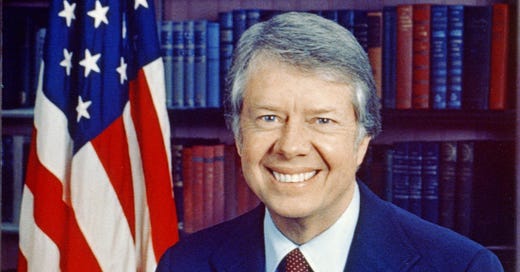Stepping off Massachusetts Avenue into Harvard Yard on a cold winter afternoon, I saw a man standing alone.
“Hello,” he said. “My name’s Jimmah Caaartah and I’m running for President of these United States.”
There were plenty of shall we say “unusual” people hanging around Harvard Square at that time so grandiose pronouncements were not entirely unexpected, but this fellow was different than a street person with megalomania.
He was wearing a handsome salt and pepper overcoat, his coifed hair also salt and pepper -- too groomed for the street. But the most arresting thing were his eyes, blue as the inside of a glacier, clear, with a direct calmness and amused self-awareness. Crow’s feet suggested someone who smiled.
“Well sir,” I said, “good luck. Where might you be from?”
“Georgia,” he answered. “I’m paying a visit to this fine state and thought I’m come see Harvard Yard.”
“That explains the accent,” I said. “I like the way you say Hoorvard Yoord, very different than the local version which is more like Hahhvahhd Yahhd.”
He smiled, those lines around his eyes creasing.
“Are you really running for President?” I asked.
“I am.”
“Do you think you have a chance?”
“Perhaps,” he said. “You see, as governor of Georgia, I’ve had some success in politics.”
“Jimmy Carter, is that right?”
“That’s right, perhaps one day you’ll vote for me.”
We shook hands or rather shook gloves, his way fancier than mine, and I parted.
Back then it was much harder to check factoids, you couldn’t just ask Siri. But Widener Library was right there so I went to the reference desk and tracked down the names of the governors of our 50 states.
“I’ll be damned,” I muttered. A peanut farmer from “Plains” of all places, who also was captain of a nuclear submarine as well as governor. Seriously?
By the time I went to find him again, he was gone.
This took place 50 years ago. This country has only existed for 250 years, so weird to say but that was back 20 percent of the nation’s lifetime. It does seem like a far-gone deep-past moment, so different than anything that could happen today: A governor, a Presidential candidate who calls himself Jimmah, just standing there by himself, saying hello.
Fast forward.
The man who beat Ted Kennedy for the nomination, the religious, monogamous man who admitted to Playboy Magazine he sometimes had “lust in his heart” (compare that human acknowledgement to the actions and attitudes of Trump), became President though just for one term. He was undone by a hostage crisis in Iran, outrageous interest rates at home, and Ronald Reagan. Few doubted his sincerity or honesty, he won a Nobel Prize, but many doubted his leadership.
Our second brief encounter took place after he left the White House.
He already was becoming the most exemplary former President of our lifetime (maybe history), pulling on jeans and picking up hammers to help build Habitat for Humanity homes (and raising them millions), donning a suit and traveling the world to encourage free and fair elections.
He had come to Haiti to monitor the election of radical priest Jean Bertrand Aristide. I was there as a journalist doing the same though of course in a much less influential way, reporting in the dusty early morning from a hard town called Gonaives as people quietly filled the streets, standing in a long line with bellies pressed against backs, risking their lives to vote. That night I joined a posse of young men from the infamous slum, Cite Soleil, who walked their community’s ballots through dark streets to the national polling center as bodyguards of paper — and hope.
The following day President Carter held a press conference to share impressions collected by his team of observers. He was at a fancy hotel called El Rancho, perched above teeming Port au Prince. Years later that hotel would be demolished by earthquake, many killed in what they thought was a safe place. But that day the scene was luxurious and secure, far from where I had been the day and night before. I remember thinking that the water in the swimming pool was the same color as the eyes of a President.
The Carter team reported that in their view the election had been remarkably free and fair. There were problems but the results were legitimate, so the new government should be as well. Of note was that ballots had not just the names of candidates, but each party’s symbol, in Aristide’s case a rooster. For people who could not read, this was important.
After President Carter made his presentation he mingled with press and staff; the same eyes and crow’s feet, attention and focus, standing with the same humility I had sensed years earlier. The same quietness hovered around him.
I shook his hand, mentioned we had crossed paths long ago when he stood alone and greeted me in Harvard Yard.
The lines around his eyes creased. “That’s a good memory of a moment that seems far in the past,” he said, soft Georgia drawl still present. “So much has happened, yet we carry on.”
Haven’t subscribed yet? To keep seeing a Voice (a cool trick), please support this local expression:





I love these two stories, Seth. Thank you for sharing them with us.
I was there in Haiti with you that day, a time that was life-changing. Even then we understood that his power and influence was not meant to be circumscribed by a mere presidency.